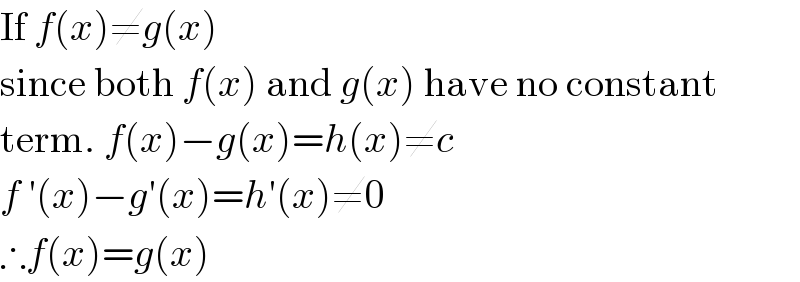
Question Number 2005 by Rasheed Soomro last updated on 29/Oct/15

$${If}\:{f}\left({x}\right)\:{and}\:{g}\left({x}\right)\:{have}\:{no}\:{constant}\:{term}\:{then} \\ $$$${f}\:'\left({x}\right)={g}'\left({x}\right)\overset{?} {\:\Rightarrow\:}{f}\left({x}\right)={g}\left({x}\right)? \\ $$
Commented by prakash jain last updated on 30/Oct/15

$$\mathrm{If}\:{f}\left({x}\right)\neq{g}\left({x}\right) \\ $$$$\mathrm{since}\:\mathrm{both}\:{f}\left({x}\right)\:\mathrm{and}\:{g}\left({x}\right)\:\mathrm{have}\:\mathrm{no}\:\mathrm{constant} \\ $$$$\mathrm{term}.\:{f}\left({x}\right)−{g}\left({x}\right)={h}\left({x}\right)\neq{c} \\ $$$${f}\:'\left({x}\right)−{g}'\left({x}\right)={h}'\left({x}\right)\neq\mathrm{0} \\ $$$$\therefore{f}\left({x}\right)={g}\left({x}\right) \\ $$
Commented by Rasheed Soomro last updated on 31/Oct/15

$$\mathcal{V}{ery}\:\mathcal{N}{ice}! \\ $$
Answered by Filup last updated on 29/Oct/15

$$\mathrm{No}\:\mathrm{constant},\:\mathrm{so}\:\mathrm{in}\:\mathrm{form}: \\ $$$${f}\left({x}\right)={ax}^{{n}} \\ $$$${g}\left({x}\right)={bx}^{{m}} \\ $$$$ \\ $$$${f}'\left({x}\right)={anx}^{{n}−\mathrm{1}} \\ $$$${g}'\left({x}\right)={bmx}^{{m}−\mathrm{1}} \\ $$$$ \\ $$$${f}\left({x}\right)={g}\left({x}\right) \\ $$$${ax}^{{n}} ={bx}^{{m}} \\ $$$$\therefore\left({ax}^{{n}} \right)'=\left({bx}^{{m}} \right)' \\ $$$${anx}^{{n}−\mathrm{1}} ={bmx}^{{m}−\mathrm{1}} \\ $$$$ \\ $$$$\therefore\mathrm{Iff}\:{an}={bm}\:\mathrm{and}\:{n}={m}\:\mathrm{will}\:\mathrm{your} \\ $$$$\mathrm{statement}\:\mathrm{be}\:\mathrm{correct} \\ $$$$ \\ $$$$ \\ $$$$\left({Sorry}\:{if}\:{this}\:{is}\:{incorrect}\right) \\ $$$${This}\:{is}\:{only}\:{one}\:{solution}.\:{I}\:{neglected} \\ $$$${the}\:{use}\:{of}\:{function}\:{such}\:{as}\:{sine}\:{cosine}\:{and}\:{tangent} \\ $$
Commented by Rasheed Soomro last updated on 29/Oct/15

$$\mathcal{THANK}^{\mathcal{S}} \:\:{to}\:{attempt}\:{the}\:{question}.\:{You}\:{have}\:{taken} \\ $$$${only}\:{a}\:{special}\:{case}\:{of}\:{polynomial}\:\left({Monomial}\right). \\ $$$${In}\:{case}\:{of}\:{polynomial}\:{f}\left({x}\right)\:{and}\:{g}\left({x}\right)\:{may}\:{be}\:{taken}\:{in} \\ $$$${general}\:{form}: \\ $$$${f}\left({x}\right)=\underset{{i}=\mathrm{1}} {\overset{{n}} {\Sigma}}{a}_{{i}} {x}^{{i}} \:\:\:\:{and}\:\:\:\:{g}\left({x}\right)=\underset{{i}=\mathrm{1}} {\overset{{n}} {\Sigma}}{b}_{{i}} {x}^{{i}} \:\:\:{prevented}\:{i}\:{to}\:{be} \\ $$$${zero}\:{in}\:{order}\:{to}\:{avoid}\:{constant}\:{term}. \\ $$
